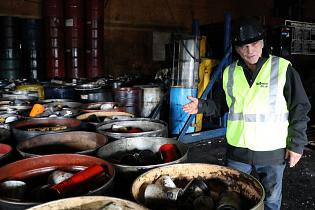Red tape strangling oil recycling, says business owner
A Sturgeon County businessman says a provincial regulator’s heavy hand threatens to push private oil recyclers like him out of the industry.
A group of privately owned oil recyclers represented by Sturgeon County resident Phil Van Brabant approached the Gazette earlier this month to talk about how the Alberta Recycling Management Authority (ARMA) was putting the squeeze on the recycling industry.
Van Brabant said his company, Van Brabant Oil, has collected, cleaned and sold used oil, jugs and filters from across Alberta since 1996 and employs 22 people.
ARMA runs Alberta’s used oil and oil filters program, collecting environmental fees from makers of oil products and distributing them to processors to offset the cost of recycling.
Van Brabant said he and other private recyclers had several issues with ARMA. One started last year when the agency asked him to provide detailed financial information for the companies he works with.
“None of our downstream processors feel it is Alberta Recycling’s business to provide any of that information to them,” he said, and many have refused to turn over what they say is proprietary information.
Van Brabant said he has to provide that information to ARMA if he wants to stay in the oil stewardship program and get the environmental fees it provides, but can’t afford to lose his current processors. Without those fees, he would have to sharply shrink the size of his company.
Van Brabant argued ARMA was meddling with how he ran his business.
“They are basically saying who we can sell to and who we can’t sell to,” he said.
Another issue was how ARMA changed how it paid out environmental fees to collectors, said John Holloway, who collects oil jugs and filters for Van Brabant out of Fort McMurray as head of TLC Recyclers.
Prior to 2018, the Alberta Used Oil Management Association would pay these fees directly to collectors after they dropped off a load of material, Holloway said. Now, ARMA pays processors such as Van Brabant who in turn pay collectors after they sell that material. As producers often sit on material until they can get a high price for it, this can delay payments to collectors for months.
“If Phil doesn’t get paid, I don’t get paid,” Holloway said, and that causes cash-flow problems.
Cori Van Brabant, secretary-treasurer of Van Brabant Oil, took issue with ARMA’s move to discourage the collection of plastic jugs used to contain car products other than oil, such as antifreeze. In the past, processors were encouraged to process these jugs even though they weren’t part of the stewardship program just to keep them out of the landfill. Now, ARMA has said to reject them.
“It’s the same material an oil jug is made out of,” Cori said.
“How does that make sense?”





